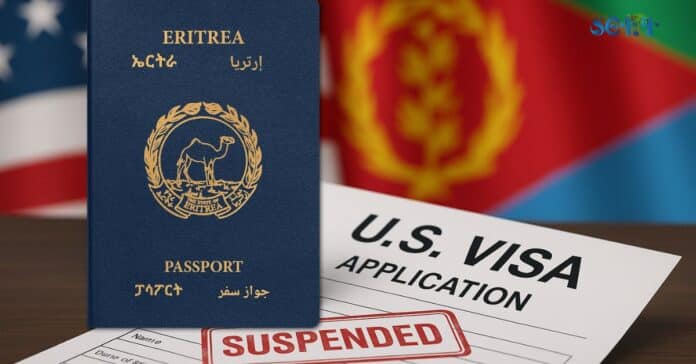Eritrea has been swept into a sweeping U.S. immigration ban not for harboring terrorism or descending into internal chaos—but for its persistent refusal to engage with international norms, according to a new presidential proclamation issued by President Donald J. Trump on June 4.
The executive order fully suspends the entry of both immigrant and nonimmigrant Eritrean nationals into the United States. While several countries made the list due to internal conflicts or terrorist threats, Eritrea stands out for a different reason: its government’s systemic failure to share identity, security, and immigration-related data with the United States.
Not About Terror — About Transparency
Unlike nations like Afghanistan, Yemen, or Libya, which were also banned due to active conflicts or extremist threats, Eritrea’s inclusion is rooted in bureaucratic and diplomatic non-compliance. U.S. authorities cited multiple areas of concern, including:
Questionable civil documentation: The central authority’s passport and identity systems lack credibility, making it difficult for U.S. officials to confirm the identity of Eritrean applicants.
Lack of criminal record sharing: Eritrea does not provide U.S. agencies access to criminal histories of its citizens.
Refusal to accept deportees: The Eritrean government has long refused to repatriate nationals who are ordered removed from the U.S.
Excessive visa overstays: Eritrea posted one of the highest overstay rates—over 55% among students and exchange visitors, and 20% for tourist and business travelers.
These issues place Eritrea in direct violation of international standards for cooperation on immigration enforcement, identity verification, and information sharing—cornerstones of U.S. national security and visa vetting policy.
Diplomatic Isolation Deepens
The proclamation categorizes Eritrea alongside countries that are either unwilling or incapable of meeting U.S. vetting standards. However, countries like Turkmenistan and Sierra Leone, which showed some signs of cooperation, received only partial restrictions. Eritrea, by contrast, has made little effort to engage or reform.
This latest move deepens Eritrea’s growing diplomatic isolation and could significantly affect Eritrean-American families, students, and travelers, cutting off nearly all legal pathways into the U.S.
A Reversible Ban, If Cooperation Improves
Despite the tough stance, the administration emphasized that the restrictions are conditional. Should Eritrea begin to share information, accept deported nationals, and improve identity management, the suspension could be lifted.
“This is not a punishment—it’s a security measure,” said the President in the proclamation. “The door remains open for countries willing to act in good faith.”
Conclusion
Eritrea’s inclusion in the U.S. travel ban sends a clear message: diplomatic non-cooperation can carry the same consequences as security threats. In a global system that increasingly relies on transparency and shared standards, Eritrea’s insular policies have placed it on the outside looking in—not because of war, but because of willful disengagement.

